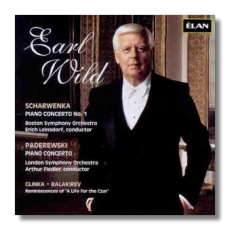
The Internet's Premier Classical Music Source
Related Links
- Latest Reviews
- More Reviews
-
By Composer
-
Collections
DVD & Blu-ray
Books
Concert Reviews
Articles/Interviews
Software
Audio
Search Amazon
Recommended Links
Site News
 CD Review
CD Review
Earl Wild

Romantic Piano Concertos
- Francis Xaver Scharwenka: Piano Concerto #1 *
- Ignace Jan Paderewski: Piano Concerto **
- Mili Balakirev: Reminiscences of Glinka's Opera "A Life for the Czar"
Earl Wild, piano
* Boston Symphony Orchestra/Erich Leinsdorf
** Boston Symphony Orchestra/Arthur Fiedler
Elan CD 82266 ADD 71:16
With the death in late 1995 of Shura Cherkassky, Earl Wild now stands alone as the last representative of the larger-than-life Romantic keyboard heroes. Born in Pittsburgh in 1915, Wild made his first record in 1934 and is still recording, although, considering his stature, a disappointingly small proportion of those recordings are currently in print.
Wild has tended to specialise to a certain extent in "big" works, virtuoso vehicles often dismissed as shallow and flashy - although not in his hands - which may be a part of the reason for his poor standing in the current catalogue.
It does seem odd, though, given today's apparent fascination for the more obscure repertoire - there at least two companies issuing discs under titles such as "The Romantic Piano Concerto" - that RCA, for whom Wild made those first discs over six decades ago, have not seen fit to reissue these late 1960s recordings themselves, but have instead licensed them to Elan, a small company hitherto unknown to me.
Still, RCA's loss is Elan's (and our) gain.
The two concertos recorded here are set firmly in the Schumann-Chopin-Liszt tradition, even though they make rather stiffer demands of the soloist, and each was written to display its composer's own virtuosity - although, peculiarly, Paderewski handed the première of his concerto to another pianist, feeling that he had insufficient time to learn his own music.
Of the two concertos on offer here, I slightly prefer the one by Xaver Scharwenka (a pupil of Liszt), of which this 1969 recording was the first. The concerto is tuneful, even memorably so - it is not always easy to summon up mentally the main themes of obscure repertoire while seated at a computer keyboard - and Wild's stunning performance lifts it even further out of the ordinary, far enough to make one wonder exactly why this concerto is still so little known.
Paderewski - the highest paid musician in history, by the way (well, until Janet Jackson's latest contract) - wrote only a single concerto, which was first recorded in 1939. This recording, made 31 years later, features the same conductor, Arthur Fiedler, whose long tenure at the Boston Pops has tended to undermine public perception of his very real talents as a serious musician.
The opening couple of minutes of this disc are the perfect sampler: listen to the way in which Erich Leinsdorf - another seriously under-rated conductor - whips up the excitement from the orchestra immediately before the soloist's entry in the Scharwenka; Leinsdorf sets the pulse racing and nothing in the remaining 25 minutes of the concerto will slow it down again.
Many companies would doubtless have been content to issue a disc consisting of just the two concertos, but I am happy to report that Elan have gone the extra mile and included a most worthwhile bonus in the shape of Balakirev's Reminiscences of Glinka's Opera "A Life for the Czar" - published in 1899 but apparently composed some 40 years earlier, which makes it contemporaneous with several of Liszt's operatic paraphrases.
Nor, perhaps surprisingly, is the comparison wholly in Liszt's favour; Balakirev's own virtuosity was considerable - his Islamey was once considered the most difficult piano piece ever written - and, even for those of us unfamiliar with Glinka's opera, this is a highly enjoyable work.
Wild's pianism here, as throughout this disc, is little short of miraculous: just listen to his astonishing control of tone colours in the quieter passages and then his ability to combine these colours with the incredibly complex arabesques with which Balakirev ornaments the themes as the piece progresses.
In case you hadn't notice, I really like this disc.
Copyright © 1996, Deryk Barker


















